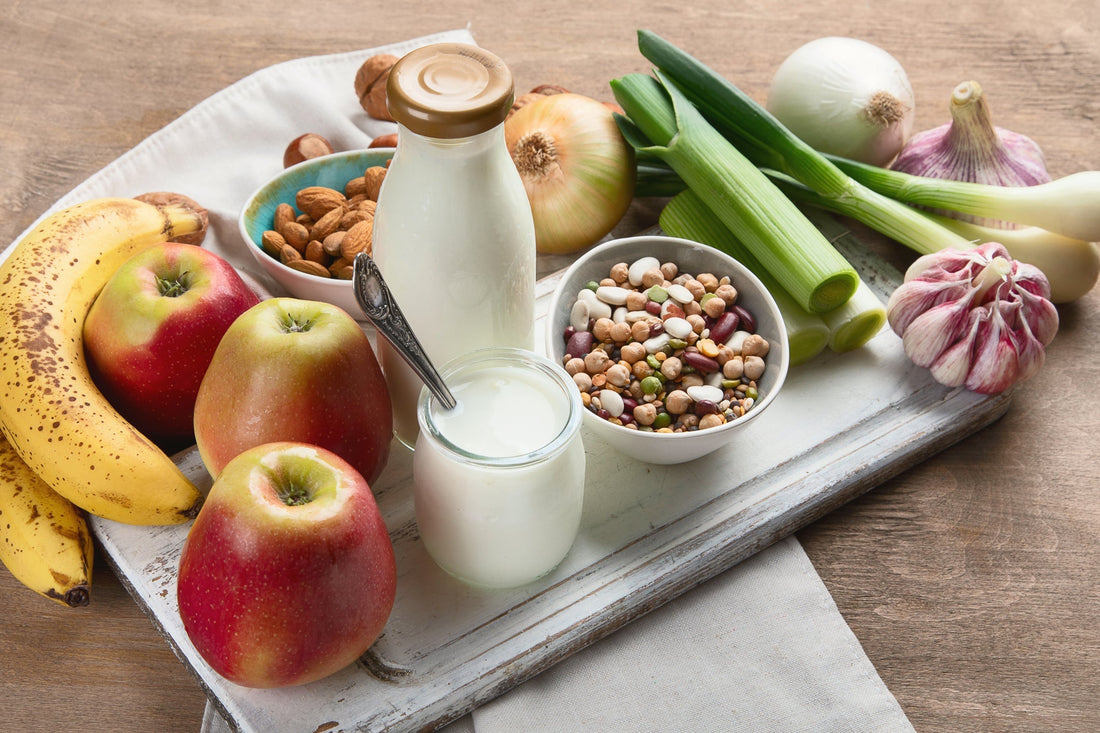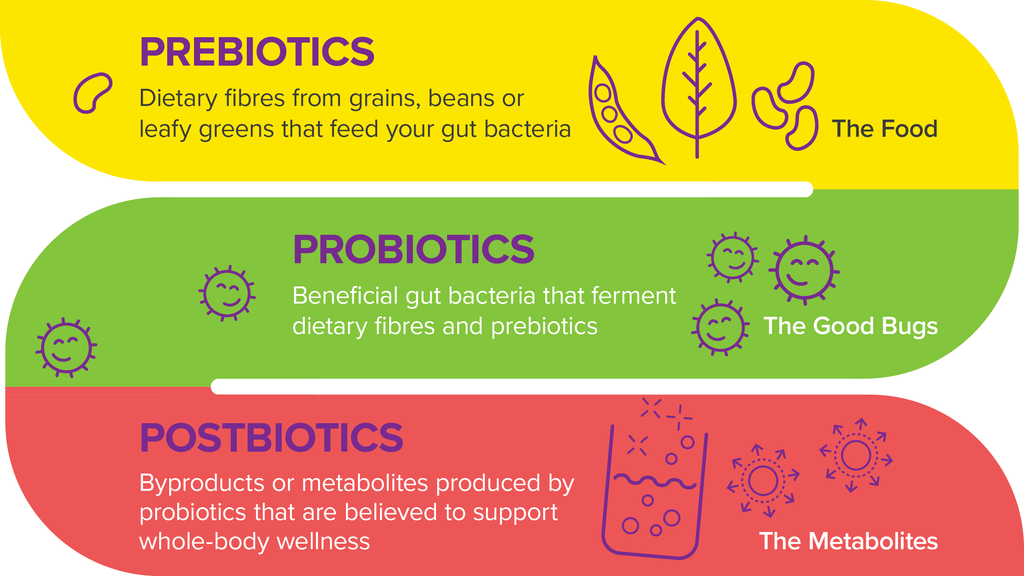Read Time: 6 min | Categories: Body Health
Probiotic and Prebiotic Foods
Leigh Matthews, BA Hons, H.Dip. NT
Share this article
The Benefits of Probiotic Foods
Like probiotic supplements, probiotic foods can restore and maintain a good balance of microorganisms in the gastrointestinal and genitourinary tracts. Probiotic foods can also help maintain a healthy pH in the gastrointestinal tract, which makes it easier for other beneficial microorganisms to thrive, and harder for disease-causing pathogenic bacteria and yeasts to get a foothold.
Probiotics found in foods can also synthesize certain fatty acids that help manage inflammation. Some probiotic species and strains even synthesize neurotransmitters and essential vitamins that the body cannot produce itself, such as vitamin B12.
Putting it all together, including probiotic foods in your daily diet, can help support:
- Immune function
- Digestive health
- Cognitive and emotional health
Probiotic foods are also a great way to support your overall health and well-being.
Probiotic foods are essential parts of almost all cultures, especially as fermentation and pickling are such convenient ways to store fresh food to tide us over during the winter months. Different probiotic foods vary in nutrient composition, with some providing lots of protein and others being a source of caffeine, vitamin C, or B vitamins. Including a wide variety of probiotic foods in your diet is a great idea for supporting digestive health and all-round health. To make the most of probiotic foods, try eating them alongside prebiotic foods.
What are Prebiotic Foods?
 While probiotic foods contain the beneficial microorganisms that make up a healthy microbiome, prebiotic foods are the ones that feed probiotics.
While probiotic foods contain the beneficial microorganisms that make up a healthy microbiome, prebiotic foods are the ones that feed probiotics.
Put another way, prebiotic foods contain a specific kind of fibre that humans can’t digest but that probiotic bacteria love. Some of the best kinds of prebiotic fibres include inulin, galacto-oligosaccharides (GOS), and fructo-oligosaccharides (FOS). These types of fibres pass through the gastrointestinal tract to reach the large intestine intact, where they fuel the good bacteria to maintain balance, or eubiosis, in the gut and beyond.
Some of the best prebiotic foods include:
- Asparagus, Jerusalem artichokes, sweetcorn
- Bananas, peaches, grapefruit, pomegranate, dates, figs
- Leeks, onions, fennel, garlic
- Cabbage, chicory, green peas, snow peas, beetroot
- Oatmeal, barley, rye, whole wheat
- Chickpeas, lentils, red kidney beans, soybeans
- Cashews, pistachio nuts
- Maple syrup
A wholefood, plant-based diet is typically rich in probiotic and prebiotic foods. In contrast, a diet that includes lots of meat and some other animal-derived products may feed undesirable bacteria in the colon.
Foods that are a good source of prebiotic fibres are also usually rich in vitamins, minerals, and phytonutrients. Prebiotics may also help support the absorption of other nutrients, in part because prebiotics and probiotics help maintain overall digestive health. Indigestible fibre also helps slow down digestion, allowing more time for nutrient absorption. Prebiotic fibre can also reduce the glycemic index of food, which makes it easier for the body to manage blood sugar.
How to Include More Probiotic and Prebiotic Foods in your Diet
Because probiotic microorganisms create gaseous byproducts when digesting prebiotic fibre, it’s a good idea to increase probiotics and prebiotics gradually. Otherwise, a sudden increase in either can lead to flatulence.
The best practice is to introduce probiotic and prebiotic foods slowly over a week, starting with a small amount each day. This gives the gut a better chance of adapting without discomfort.
What about FODMAPs?
If you’re following the Monash University low-FODMAP diet to help with irritable bowel syndrome (IBS), you’re likely avoiding many probiotic and prebiotic foods. Having IBS doesn’t mean missing out on the benefits of probiotics and prebiotics. In fact, these kinds of foods can be especially helpful for anyone with digestive troubles.
The thing to remember is that the FODMAP diet is only meant to be used for 2–6 weeks to allow some relief time for the digestive system. Thereafter, you can gradually reintroduce a broad range of foods, with the long-term goal of returning to a normal diet with few restrictions and a good intake of high-fibre foods. Unnecessarily restricting probiotic and prebiotic foods long-term can mean missing out on beneficial fibre and many vitamins, minerals, and other nutrients.
When Else are Probiotic and Prebiotic Foods a Good Idea?
Probiotic and prebiotic foods are great to include in abundance during or after a course of antibiotics. This can help restore and maintain a healthy microbiome, especially after the use of broad-spectrum antibiotics that don’t discriminate between helpful and harmful microorganisms.
A higher amount of probiotic and prebiotic foods is also recommended for anyone who is nursing an infant. This is because friendly bacteria pass into breast milk and can help develop an infant’s immune system. Probiotic and prebiotic foods can also help reset the balance in instances of diarrhea, constipation, and nausea or vomiting, as well as when managing ongoing digestive issues. However, it’s best to consult with a health care practitioner before making any significant dietary changes and before taking any new supplements.
Finally, it’s a good idea for older adults to ensure a regular intake of probiotic and prebiotic foods. This is because healthy gut bacteria often decline with age. To maintain good health, support digestive health, and help relieve constipation, include prebiotic- and probiotic-rich foods daily.
Probiotic and Prebiotic Supplements
There are many ways to include probiotic foods in your everyday diet, but it can still be a struggle to eat sufficient amounts to really benefit health. Plus, some probiotic foods take a little getting used to if you’re not familiar with the taste or how to cook with them.
There are also times when a critical-care probiotic supplement may be better positioned to quickly restore a disturbed microbiome, such as after sickness or antibiotic use.
High-quality probiotic supplements offer a guaranteed intake of beneficial microorganisms. Some also include prebiotics to feed those bacteria. However, not all probiotic supplements are created equal. The species and strains of a probiotic make a difference, as does the dose. And naturally, the only probiotics that do anything for good health are the ones that make it all the way to the intestine alive.
All Webber Naturals probiotics are selected for their ability to survive gastric acid intact and have a guaranteed count of live cells (colony forming units, or CFUs) right up to expiry, not just at manufacture.
